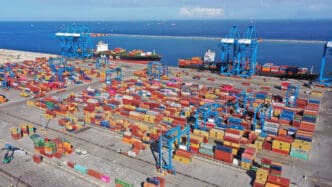Executive Summary
- Rune Skinnebach officially began his four-year tenure as the new European Union Ambassador to Ghana on September 20, 2025, pledging to strengthen political, cultural, and economic ties and establish the EU as Ghana’s primary security and political partner.
- The Ghana-EU partnership is underpinned by key agreements like the interim Economic Partnership Agreement (EPA), granting Ghana duty-free and quota-free access to the EU market, and a Voluntary Partnership Agreement on legal timber trade.
- The EU, through its Global Gateway Strategy and ‘Team Europe’ initiative, supports Ghana’s sustainable development with substantial funding and technical cooperation in areas such as green growth, smart cities, good governance, critical infrastructure, energy, and agribusiness.
The Story So Far
- The strong and enduring partnership between Ghana and the European Union, established since Ghana’s independence in 1957, is built upon extensive political, cultural, and economic ties. This relationship is strategically underpinned by the EU’s Global Gateway Strategy, focusing on sustainable development, and bolstered by key agreements like the interim Economic Partnership Agreement, which grants Ghana duty-free access to the EU market while Ghana reciprocally opens its market to EU products, alongside substantial EU funding and cooperation initiatives across various sectors.
Why This Matters
- The appointment of Ambassador Rune Skinnebach signals a renewed commitment to deepening Ghana-EU relations, with the EU aiming to become Ghana’s primary security and political partner of choice while continuing to bolster economic ties through the existing Economic Partnership Agreement, which provides Ghana with duty-free access to the EU market. This partnership will also see sustained EU support for Ghana’s development in critical areas such as green growth, sustainable infrastructure, education, and good governance, under initiatives like the Global Gateway Strategy.
Who Thinks What?
- Rune Skinnebach, the new EU Ambassador, expressed his anticipation of strengthening relations during his four-year tenure, aiming to establish the EU as Ghana’s primary security and political partner of choice and highlighting EU support in youth development, education, and sustainability.
- President John Dramani Mahama reaffirmed Ghana’s mutual commitment to deepening the partnership with the EU, formally accepting the new Ambassador’s credentials.
- The European Union, through its Global Gateway Strategy and Economic Partnership Agreements, aims to support Ghana’s sustainable and inclusive development, focusing on green growth, smart cities, good governance, and enhanced security, while offering duty-free and quota-free access to its market for Ghana’s exports.
Rune Skinnebach officially assumed his role as the new European Union Ambassador to Ghana on Friday, September 20, 2025, presenting his Letters of Credence to President John Dramani Mahama at the Jubilee House in Accra. This formal ceremony marked the commencement of his mission to further strengthen the long-standing political, cultural, and economic ties between Ghana and the European Union.
Ahead of the presentation to President Mahama, Ambassador Skinnebach also submitted his Open Letters to the Minister for Foreign Affairs, Mr. Samuel Okudzeto Ablakwa. These diplomatic protocols signify the formal recognition and acceptance of his accreditation by the Ghanaian government.
Both President Mahama and Ambassador Skinnebach reaffirmed their mutual commitment to deepening the partnership between Ghana and the EU. Ambassador Skinnebach expressed his anticipation of strengthening these relations during his four-year tenure, highlighting Ghana’s status as a preferred trading partner for the Union.
He further pledged to work towards establishing the EU as Ghana’s primary security and political partner of choice. He also noted that EU support in areas such as youth development, education, and sustainability underscores the depth of its partnership with Ghana.
A seasoned diplomat with over two decades of experience in the EU’s external relations, Ambassador Skinnebach brings extensive expertise to his new role. His previous assignments include serving as EU Ambassador to Malawi, Deputy Head of Division for Pan-African Affairs in Brussels, and Head of the Political, Press and Information Section at the EU Delegation to Zambia.
Notably, his diplomatic career began in 1994 with a posting at the EU Delegation in Ghana, providing him with early exposure to the bilateral cooperation. Ambassador Skinnebach succeeds Ambassador Irchad Razaaly, who concluded his duty tour in Ghana last month.
Enduring Ghana-EU Partnership
Historical Ties and Strategic Frameworks
Ghana and the European Union have maintained close political, cultural, and economic relations since Ghana’s independence in 1957. The EU currently supports Ghana’s pursuit of sustainable and inclusive development through its Global Gateway Strategy.
This strategy primarily focuses on green growth, smart and sustainable cities, robust good governance, and enhanced security. The partnership aims to foster long-term stability and prosperity in the region.
Economic Partnership Agreements
The partnership is underpinned by key agreements, including an interim Economic Partnership Agreement (EPA) and a Voluntary Partnership Agreement on legal timber trade. The EPA grants Ghana duty-free and quota-free access to the European Union market for its exports, aiming to bolster economic ties and promote sustainable development.
In return, Ghana is gradually opening its market to approximately 80% of EU products, a process initiated in 2021 and set to conclude by 2029. This reciprocal arrangement seeks to strengthen economic integration and enhance Ghana’s competitiveness in the global market.
Funding and Cooperation Initiatives
In recent years, the EU has provided substantial funding and technical cooperation across various sectors in Ghana. These areas include critical infrastructure development, energy, agribusiness, and the strengthening of public institutions.
Under the Joint Programming Document for 2021-2027, the ‘Team Europe’ initiative—comprising the EU, its Member States, and institutions—is implementing projects focused on Smart, Green, and Digital Recovery. These efforts encompass the rehabilitation of the Kpong Dam, support for vaccine production, facilitating energy transition, and promoting green finance for private sector development.
Looking Ahead
Ambassador Skinnebach’s assumption of duty marks a renewed chapter in the robust relationship between Ghana and the European Union. With commitments from both sides to deepen cooperation across trade, security, and sustainable development, the partnership is poised to continue its trajectory of mutual benefit and strategic alignment.








